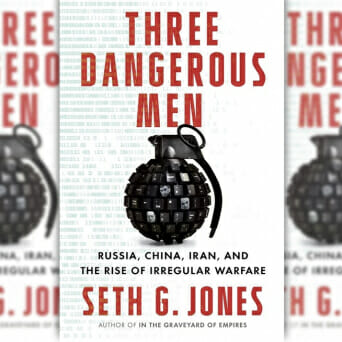On Wednesday, April 27, 2022, the Asia Policy Program will cohost, with the Clements Center for National Security, the Strauss Center for International Security and Law and the Center for Russian, East European, and Eurasian Studies, the Intelligence Studies Project‘s event Three Dangerous Men: Russia, China, Iran and the Rise of Irregular Warfare, a book talk featuring Dr. Seth Jones, Director of the International Security Program at the Center for Strategic and International Studies (CSIS). An expert panel including Dr. Michael Dennis, a senior analyst at the Army Futures Command; Dr. Sheena Chestnut Greitens, associate professor at the LBJ School of Public Affairs and founding director of the Asia Policy Program; and Dr. Bianca Adair, CIA Resident Intelligence Officer at the LBJ School will discuss “gray zone” conflict and irregular warfare as practiced by the Russian, Chinese, and Iranian governments. The expert panel will be moderated by Paul Pope, a Professor of Practice at the LBJ School and ISP Senior Fellow.
Registration required.
BIOGRAPHY
Seth G. Jones is senior vice president, Harold Brown Chair, director of the International Security Program, and director of the Transnational Threats Project at the Center for Strategic and International Studies (CSIS). He leads a bipartisan team of over 50 resident staff and an extensive network of non-resident affiliates dedicated to providing independent strategic insights and policy solutions that shape national security. He also teaches at Johns Hopkins University’s School of Advanced International Studies (SAIS) and the Center for Homeland Defense and Security (CHDS) at the U.S. Naval Postgraduate School. Prior to joining CSIS, Dr. Jones was the director of the International Security and Defense Policy Center at the RAND Corporation. He also served as representative for the commander, U.S. Special Operations Command, to the assistant secretary of defense for special operations. Before that, he was a plans officer and adviser to the commanding general, U.S. Special Operations Forces, in Afghanistan (Combined Forces Special Operations Component Command–Afghanistan). In 2014, Dr. Jones served on a congressionally mandated panel that reviewed the FBI’s implementation of counterterrorism recommendations contained in the 9/11 Commission Report. Dr. Jones specializes in irregular warfare, counterterrorism, and covert action. He is the author of Three Dangerous Men: Russia, Iran, China and the Rise of Irregular Warfare (W.W. Norton, 2021); A Covert Action: Reagan, the CIA, and the Cold War Struggle in Poland (W.W. Norton, 2018), Waging Insurgent Warfare (Oxford University Press, 2016), Hunting in the Shadows: The Pursuit of al Qa’ida after 9/11 (W.W. Norton, 2012), and In the Graveyard of Empires: America’s War in Afghanistan (W.W. Norton, 2009). Dr. Jones has published articles in a range of journals, such as Foreign Affairs, Foreign Policy, and International Security, as well as newspapers and magazines like the New York Times, Washington Post, and Wall Street Journal. Dr. Jones is a graduate of Bowdoin College and received his M.A. and Ph.D. from the University of Chicago.
Michael P. Dennis has over 20 years of experience researching irregular warfare and is a leading expert on Chechnya, the North Caucasus insurgency, and the Russo-Chechen Wars. He spent over 5 years living with Chechen rebels and refugees in the Pankisi Gorge along the Chechen-Georgian border, Azerbaijan, Poland, Belgium, and Turkey exploring the conditions under which displaced populations attitudinally support political violence. His post-doctoral research focused on Chechen attitudes towards foreign fighters in Ukraine and Syria. In the Second Russo-Chechen War, he served with the International Rescue Committee in the refugee tent-cities in Ingushetia and helped rebuild infrastructure in the then-Russian occupied cities of Samashki, Urus-Martan, and Grozny, Chechnya. In 2004–2011, he directed the Chechnya Advocacy Network, an international humanitarian organization, and briefed Congress on multiple occasions to raise support for refugee assistance. He later joined the National Ground Intelligence Center (NGIC) and served as the Senior Intelligence Analyst for the Middle East. During this time, he was also an instructor at the John F. Kennedy Special Warfare Center and School. He taught U.S. Army Special Forces a novel diagnostic analytical framework on insurgency and civil war, which he co-developed, and lectured on conceptualizing Gray Zone warfare and “Lessons Learned from Living with Insurgents.” After NGIC, he joined the Army Futures Command where he served as the Chief of Intelligence Operations and later Chief of Strategic Futures. His awards include the U.S. Army Civilian Service Commendation Medal, NGIC’s Russel B. Hardin Analyst of the Year Award for Analytical Excellence, and an Office of the Director of National Intelligence (ODNI) Exceptional Analyst Research Fellowship. Dr. Dennis’s research has been published in Security Studies, and he recently completed an academic book manuscript on his work with Chechen refugees. He holds a Ph.D. in Government from The University of Texas at Austin. He was a Fulbright Scholar and speaks Chechen and Russian. Prior to university, he was an enlisted Rifleman in the United States Marine Corps, deploying to East Africa to support combat operations in Somalia and later, the emergency evacuation of American personnel from Rwanda during the 1994 genocide. He spent his final year with the Marine National Wrestling team.
Sheena Chestnut Greitens is an associate professor at the Lyndon B. Johnson School of Public Affairs at the University of Texas at Austin and founding director of the Asia Policy Program. Her work focuses on East Asia, authoritarian politics, and American national security policy. She is currently working on two main research projects: one on China’s internal security policies and their implications for China in the world, and another on authoritarian diasporas, particularly focused on North Korea. Dr. Greitens is currently a visiting fellow at the American Enterprise Institute. Previously, she was a non-resident senior fellow at the Brookings Institution, an adjunct fellow with the Korea Chair at the Center for Strategic and International Studies, and an associate in research at the Fairbank Center for Chinese Studies at Harvard University. From 2015 to 2020, Dr. Greitens was an assistant professor of political science at the University of Missouri, and co-director of the University’s Institute for Korean Studies. Her work on China and North Korea has appeared in academic journals and edited volumes in English, Chinese, and Korean, and in major media outlets. She has also previously testified to Congress on security issues in the Indo-Pacific. Her first book, Dictators and their Secret Police: Coercive Institutions and State Violence (Cambridge, 2016) received the 2017 Best Book Award from both the International Studies Association and the Comparative Democratization section of the American Political Science Association. In 2017–18, Dr. Greitens served as the First Lady of Missouri, where she helped lead the state’s trade mission to China and South Korea, and successfully advocated for major legislative and administrative reforms to Missouri’s policies on foster care, adoption, and child abuse prevention. She holds a Ph.D. from Harvard University; an M.Phil from Oxford University, where she studied as a Marshall Scholar; and a bachelor’s from Stanford University.
Bianca Adair, an officer in the Directorate of Operations at the Central Intelligence Agency (CIA), is the Resident Intelligence Officer at the University of Texas at Austin’s Lyndon B. Johnson School of Public Affairs (2020–22). She has more than 16 years of federal government service in leadership positions in Washington, D.C., and foreign field posts. In her nine years at the CIA, Dr. Adair has worked in the Middle East, Europe, and North Africa on security, counterterrorism, and foreign policy, with a special focus on Iran. Prior to her time in the CIA, she served in Iraq and the United Arab Emirates as a Foreign Service Officer in the U.S. Department of State. The recipient of a Fulbright Research Grant on Austrian-Hungarian Relations and conversant in Persian (Farsi), French, Tajiki, German, and Hungarian, Dr. Adair holds a Ph.D. in political science from The University of Alabama.
Paul Pope retired from the CIA after multiple foreign tours, service as Chief of Station, and assignments as a Chief, Deputy Chief, and Chief of Ops in the Directorate of Operations’ three largest components. As Chief of Training and Tradecraft Division, he was responsible for DO training, capture of “lessons learned,” and adapting to emerging technical challenges and mission imperatives. He was acting ADNI for Partner Engagement for an extended period and Head of Delegation to NATO’s Civilian Intelligence Committee. Pope was DNI/DCIA Representative to Commander, US Pacific Command and his component commands. Prior to the NCS, he served on the National Intelligence Council for the Near East and South Asia and led an analytic unit in the Directorate of Intelligence. Pope was an Army officer, with service on the Army General Staff after twice commanding at the company level, including command of the only active firebase in the Army on the Korean DMZ. He received his M.A. With Distinction from the Naval Postgraduate School and BS from the United States Military Academy at West Point. He is a Distinguished Graduate of Command and General Staff College and a graduate of the National War College’s CAPSTONE course.
For questions regarding the event, please email: intelligencestudies@austin.utexas.edu



